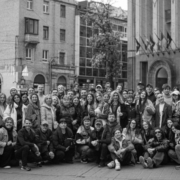Our Young People Need Community, Says Expert Panel
By: Helping Hands
Children and young people today have greater access to information and resources than any other generation in history.
Sadly, though, the information age can leave young people feeling overwhelmed, impacting their wellbeing. It leads those of us who care for and support young people to ask: How can we enable young people to thrive?
In this episode of Helping Hands, Laura Bennett is joined by youth worker and online gamer, Kiran Skariah; psychologist, Collett Smart; and teacher, Sarah Crawford – to discuss how we can create environments for young people to be their best at home, at school, in social circles and online.
All our panellists agreed that one of the keys to supporting young people, is to help them feel safe.
Sarah Crawford addresses how she achieves this for the young people in her care within the school environment, saying that it’s important for children to be able to name a trusted adult in whose company they feel safe.
“Ask them to name safe people… Often in a primary school environment, because they consistently have the one teacher, it might be that one teacher (who is their safe person), … it’s really important that the children know that there is a safe adult that they can go and speak to at all times.”
Feeling Free to Express Themselves
Kiran Skariah links the safety a young person feels with their willingness to express themselves and to be open. In the gaming environment Kiran has created for his young audience, safety is a high priority. It’s seen in every interaction, from the gaming activities, to the language used. Kiran says that when the environment is safe, teenagers feel cared for and supported.
“A big part of it is being really intentional with all the decisions that we make, from top down … Different personalities will come out in different ways … The people who are (in person) really quiet in nature … when in the online mode, are sometimes the most conversational of the group. Get them in a mode where they’re not making eye contact necessarily, and they’re able to type, and then they get to really just open up and be themselves.’
Collett Smart says that sense of care and support, is why Kiran’s ministry is so effective. She encourages parents to help their kids find a similar ‘tribe’: a community where they feel supported and seen.
‘We have these children with all different abilities or disabilities. Some children might love the online gaming world, and then we need to get them into safe spaces online … For some of our kids it might be sport, or it might be music, or it might be art. For some of our kids, the place that they find their tribe is not necessarily school.’
Collett reminds viewers that, while ever our children and young people are still growing towards independence, they need the safe adults in their lives to care for and support them through guidance towards the safe environments and communities that will help them be their best at home, at school, in social circles and online.
With our help to access communities and healthy ways of self-expression, it’s exciting to see the ways in which the next generation of Australia’s leaders and decision-makers can be enabled to thrive.
Catch up on full episodes of Helping Hands on 9NOW.
Article supplied with thanks to Helping Hands.
Feature image: Kiran Skaria on this episode of Helping Hands
About the Author: Helping Hands is an Australian produced TV program that airs on 9GEM, Channel 9 and 9NOW, and showcases people and organisations who make the world a better place.


